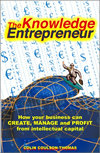 |
 |
|
 |
Maximising benefits from IT and e-Business
By Professor
Colin Coulson-Thomas
IT and e-business should support how people would prefer to work
and learn, and enable them to operate in new and better ways. But too
often it constricts and constrains rather than liberates. Individuals
and teams have to compromise and change in order to fit in with the requirements
of technology. The successful operation of IT becomes an end in itself.
Poor investments in IT set existing ways of operating in concrete rather
than creating additional options, value and choices for customers. IT
should support more intimate relationships with customers, suppliers and
business partners; facilitate learning, adaptation and change; enable
entrepreneurship and integrate learning and working. It should make it
easy for people to share information, knowledge and expertise. Smart users
employ it to secure operating efficiencies and create new electronic markets.
So what do the winners do differently to make IT and e-Business an enabler
rather than a barrier? To answer these questions a research programme
led by the author has examined the corporate experience of over 2,000
companies. The results are summarized in: ‘Transforming the Company,
Manage Change, Compete and Win’*.
Losers tend to adopt cautious, tentative and half-hearted approaches.
They dabble and test rather than fully commit. For example, they may create
a static website featuring background information about themselves and
then use the lack of visitors that is likely to result as a vindication
of the modest nature of their investment. The consequences of inaction
are used to justify further lethargy and inertia.
When losers do act they are often naive and give little thought to the
likely reactions of others. They decide they too would like a web presence
and its establishment becomes an end in itself irrespective of whether
it has a purpose or would help achieve certain objectives. Not surprisingly,
the sites that result attract few visitors.
Winners are more positive, considered and open-minded. They use e-business
to expand their customer base and provide additional support services
to existing consumers. Some replace physical market places with new electronic
market spaces.
People in winning companies get to know website visitors and their interests,
and endeavour to provide a complete, personalised and regularly updated
service or experience. They start with a problem or opportunity from a
user perspective.
Winners think about how new e-business channels might make it easier for
customers to access the information and opportunities that they need.
They examine ways in which selection and purchasing might be made simpler
for suppliers, for example by providing on-line search, configuration,
pricing and cost-justification tools.
Every effort is made to build iterative relationships with each individual
and provide additional value to that which might be obtained from any
alternatives. Wherever possible visitors are enabled to help themselves.
Electronic templates allow visitors to present their requirements, or
any problems they might have, in a way that makes it easier to provide
a relevant response. On-line services could range from simple ordering
and tracking systems to complex self-design facilities.
Winners invite feedback from users and their people are encouraged to
actively consider how they can make more extensive use of e-business applications.
Reactions, comments and suggestions are sought, obtained and acted upon.
The financial costs involved represent a minor element of the total investment
of time and commitment in creating services and facilities that meet user
needs and lock them in.
Winners create and actively participate in virtual communities. They encourage
mutual sharing and support. By enabling interaction and introducing dynamic
elements they encourage repeat visits. Regular reviews occur and findings
are acted upon to help ensure that whatever is offered continues to be
of interest, relevant and vital. Their involvement enables them to monitor
trends, identify evolving concerns and spot emerging aspirations and requirements
before they crystallise.
E-business technologies and principles are being used to create new markets
and change how business is done. For example, procurement is undertaken
electronically. Intelligent agents search for suitable suppliers. Opportunities
are put out to electronic auction.
A company’s web presence can be used in many ways to build closer
and interactive relationships with customers. Many IT companies allow
their software products to be purchased and downloaded via the Internet.
Guinness produced a screen saver version of its Guinness.com website that
can be downloaded.
Electronic links can encourage intimacy and enable 24-hour trading and
access to information, knowledge and opportunities. Responses can be made
within seconds. On-line visitors can be helped to diagnose problems, assess
requirements and assemble or develop solutions. E-Business and mobile
technologies are profoundly changing relationships between businesses
and their customers, suppliers and business partners.
There are so many opportunities to challenge and improve on current practices
that all members of staff should be encouraged to consider the possibilities.
Ford in the US and Powergen in the UK have provided all their employees
with a home computer. Senior managers believe the skills and experience
they acquire will benefit their contributions during office hours.
Success can depend upon the extent to which a web presence is accessible,
distinctive and memorable. Follow-up fulfilment processes and offerings
need to be in place to ensure that after an initial contact interested
visitors are converted into buyers and continuing relationships are forged.
Federal Express has redesigned its core business processes to allow the
great bulk of its parcel shipments to be ordered, arranged and managed
via the Internet. At any time during the day or night customers can log
on and see exactly where each item is. The company’s most valuable
assets used to be its trucks and aeroplanes. Its value now primarily derives
from its processes and supporting software.
The trick is to apply technology to the critical success factors for business
success. Too many investments are in areas that do not make the difference
between winning and losing. Standard packages may be fine for non-critical
activities but bespoke development in crucial areas for competitive advantage
can differentiate and result in the creation of new intellectual capital.
Intimate and mutually beneficial relationships are the key to bespoke
responses and sustained knowledge and value creation. The effective use
of IT has become very dependent upon attitudes towards such relationships,
especially ‘external’ parties and customers in particular.
The key question is the extent to which they are perceived and treated
as full members or citizens of the network.
© Colin Coulson-Thomas, 2005

Professor Colin Coulson-Thomas |
About the Author:
Prof. Colin Coulson-Thomas, an experienced company chairman, has
advised over 90 boards and management teams on director, board and
corporate development. Formerly the world’s first Professor
of Corporate Transformation and Process Vision Holder of major transformation
projects, he is the UK’s first Professor of Competitiveness
and can be contacted:
Tel: 01733 361 149
Fax: 01733 361 459
Email: colinct@tiscali.co.uk
Web: www.ntwkfirm.com/colin.coulson-thomas
*‘Transforming the Company, Manage Change, Compete and Win’
by Colin Coulson-Thomas and published by Kogan Page can be ordered
by Tel. 01903 828800; Fax. 020 7837 6348; E-mail: orders@lbsltd.co.uk
or on-line at www.kogan-page.co.uk
or www.ntwkfirm.com/bookshop
|
|
Transforming the Company: Manage Change, Compete & Win
Colin Coulson-Thomas shows that to bridge the gap between rhetoric
and reality, business people must make far-reaching decisions about
the value to them and their companies of particular theories, past
assumptions and traditional approaches. Based on original research,
the first edition of this was ahead of its time and predicted many
of the current management trends. The author now brings the text bang
up-to-date for the 21st century. This second edition of Transforming
The Company shows how to turn theory into practice by highlighting
the obstacles and barriers that confront companies when trying to
bring about change. For management at all levels faced with this task,
this thought-provoking book will inspire and enlighten. |
| 
Buy
UK Buy
US
|
The Knowledge Entrepreneur: How Your Business Can Create,
Manage and Profit from Intellectual Capital
In many companies knowledge management has focused almost exclusively
upon the packaging of existing knowledge. This book is designed
to help readers boost revenues and profit by significantly improving
the performance of existing activities and also creating new offerings
that generate additional income. It shows how practical knowledge-based
job-support tools can transform work group productivity, and reveals
the enormous scope for addressing contemporary problems such as
"information overload" with imaginative responses. Additional
information includes: a list of possible commercial ventures; detailed
checklists that can be used for identifying and analysing opportunities
for knowledge entrepreneurship; and exercises for assessing entrepreneurial
potential and "scoping" possible products and services.
The free CD-ROM packaged with the book gives examples of particular
knowledge-based job support tools that have dramatically improved
desired results in crucial areas such as winning more business.
|

top of page |
 |
